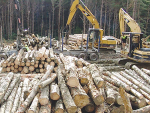The time for more regulations is over.
That's the clear message from the new Agriculture and Trade Minister Todd McClay, speaking to Rural News a day after he was announced to take on this role in the new National-led coaltion government.
McClay's been told by his boss, Christopher Luxon, to roll up his sleeves get stuck in and let farmers know that the new Government is going to let them farm.
One of his immediate concerns is to signal National's expectations around the freshwater farm plans, which regional councils are currently going through. There has been widespread criticism from the rural community about the pace and the demands some councils are putting on farmers and growers.
"These plans - along with the RMA - are causing huge concern and confusion and there is going to be change," he told Rural News. "In regard to the freshwater policy, we want to calm this down, have a reasonable process around it and talk to councils about the timeframe which has been set and whether this legislation needs to be paused."
McClay claims the previous Minister for the Environment, David Parker, rammed stuff through Parliament and didn't talk to anybody - including farmers who want to meet their obligations.
He says the legislation has been dumped on councils who are bearing the brunt of the cost and are being left to fend for themselves.
McClay says he'll be talking with the new Environment Minister, Penny Simmonds - who he says has a good farming background - and get a sense of the process and the way forward and desire to get things right.
"An example of the problem is Northland, that would see 25% of farms taken out of production. This is just madness and it's not good for NZ and it's not going to produce better environment outcomes."
He says the new coaltion government will quickly start looking at all the rules and regulations that have been imposed over the years, looking at the ones that need to be changed or dumped.
McClay believes better regulations with clear outcomes are needed to bring back confidence to the rural sector.
He says the best way to get good regulations is to work with the people affected.
To that end, in the coming weeks he'll be meeting with farming leaders as part of the process of getting input from the primary sector.
"We will be developing regulations in partnership with rural New Zealand, not imposing regulations on them, as has been the case."











